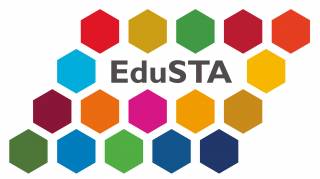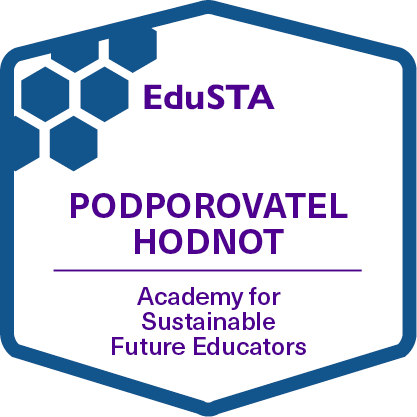The first pilot was conducted with 27 second-year student teachers enrolled in the lifelong learning programme “Future Teachers of Vocational Educational Subjects”. In winter semester 2024/25, a “Value Awareness Supporter” micro-badge become one of key components of subject Environmental Education.
There, students were introduced to:
- practical applications of environmental education goals
- theoretical knowledge in sustainability and its educational implications
- methods for fostering critical thinking and value reflection among students
This alignment allowed participants to build on their existing knowledge while exploring innovative strategies for integrating sustainability into their teaching.
Students completing the “Value Awareness Supporter” micro-badge were expected to:
- integrate sustainability values into teaching: develop activities promoting empathy, reflection, and responsibility
- reflect on personal values: understand how their values shape teaching practices and interactions
- design innovative educational strategies: encourage learners to explore their values and act on environmental issues
- foster collective responsibility: use community-focused projects to promote sustainability awareness
Students’ task was creating a presentation on one of ten predefined topics, such as waste sorting, alternative energy sources, national parks of the Czech Republic, or environmental disasters. The assignment emphasized both personal reflection and practical application, with the following components:
Topic exploration
- key facts and context related to the chosen topic
- explanation of its importance for sustainability education
- analysis of its potential to shape students’ environmental values and actions
Personal values identification
- reflection on personal sustainability values (e.g. resource conservation, minimalism, biodiversity preservation)
- discussion of how these values influence their perception of the topic
Integration into teaching
- proposed methods for incorporating personal values into teaching
- suggested activities to help students identify and reflect on their own values
Empathy and reflection support
- strategies to foster empathy and awareness of the impact of actions on sustainability
Community engagement
- use of community projects to enhance sustainability education
Conclusion and reflection
- summary of how the assignment influenced their understanding of sustainability values
As a result, 12 out of the 27 participants, successfully earned the “Value Awareness Supporter” micro-badge. The remaining students cited external obligations and time constraints as barriers to completion. Submissions were evaluated based on:
- clarity and depth of reflection: how well students identified and reflected on personal values
- practicality of proposed methods and tools: the feasibility of integrating values into educational practices
- effectiveness in fostering empathy: strategies to engage students in sustainability issues
The list of assigned topics included specifically:
- Incorporating Environmental Education into elected Subjects at Vocational Schools (Analysis of how environmental education can be integrated into vocational subjects)
- Floating Plastic Islands (Exploration of the impact of plastic waste on oceans and strategies to reduce single-use plastics)
- Ecological and Natural Disasters and Their Impact on Earth (Reflection on environmental disasters and their long-term effects)
- National Parks of the Czech Republic/Protected Landscape Areas/Nature Reserves (Protection of natural areas and their importance for biodiversity)
- Memorial Trees and the “Tree of the Year” Contest (The symbolic importance of trees in promoting environmental values)
- Global Issues (e.g., Deforestation/Desertification/Other Important Topic) (Analysis of global environmental problems and sustainability solutions)
- Ecological Agriculture (Promotion of sustainable farming and awareness of eco-friendly food production)
- Alternative Energy Sources (Examination of renewable energy and its impact on sustainability)
- Elements of Ecology, Nature, and Environment in Literature/Music/Movies/Art (Reflection on environmental themes in artistic expressions)
- Waste Sorting (Responsible waste management and its environmental benefits)
Some notable student submissions included:
- National Parks of the Czech Republic: A comprehensive presentation exploring the unique biodiversity and conservation goals of Czech national parks. It proposed interactive field trips for students, promoting experiential learning and environmental stewardship.
- Floating Plastic Islands: An in-depth analysis of oceanic plastic pollution, emphasizing its ecological consequences and introducing a classroom activity to encourage students to minimize single-use plastics.
- Sorting Waste in Schools: A detailed guide on implementing school-wide recycling initiatives to reduce waste and enhance environmental awareness among students.
- Elements of Ecology in Movies: A creative project linking environmental themes in popular movies to classroom discussions, aiming to enhance empathy and reflection on ecological issues through multimedia.
- Environmental Impact of Agriculture: A presentation examining sustainable farming practices, advocating for the inclusion of hands-on activities like school gardens to teach students about reducing environmental impacts.
- The Impact of Natural Disasters: A study on the Aral Sea ecological disaster, showcasing its environmental and social impacts while encouraging students to critically analyse the outcomes of unsustainable practices.
Milestone badge “Reflexive Praxis” with micro-badge “Conscious Change Agent” was incorporated into an undergraduate BSc study programme “Pedagogy for Practical Training” (UPV1) in spring semester 2023/24 and it was integrated to an existing subject titled “School Pedagogy”.
In the next EduSTA blog contribution, we will bring a broader overview of piloting “Reflexive Praxis”.
The pilots at CZU successfully demonstrated the integration of the “Value Awareness Supporter” micro-badge into the Environmental Education course and milestone badge “Reflexive Praxis” into School Pedagogy course. By aligning course content with ESD competences, the project not only enhanced student teachers’ understanding of sustainability but also provided them with practical tools to inspire critical thinking and responsible action in their future classrooms. This initiative represents a significant step forward in embedding sustainability into vocational teacher training programmes.
This success motivated the IEC team to continue with these initiatives also beyond the end of EduSTA project. These days, the course titled “Sustainable Future Educator” has been implemented on CZU Moodle and will be offered as a new life-long learning course.
Author: Barbora Jordánová
Main photo: CZU Prague
Digital open badge photo: EduSTA consortium



